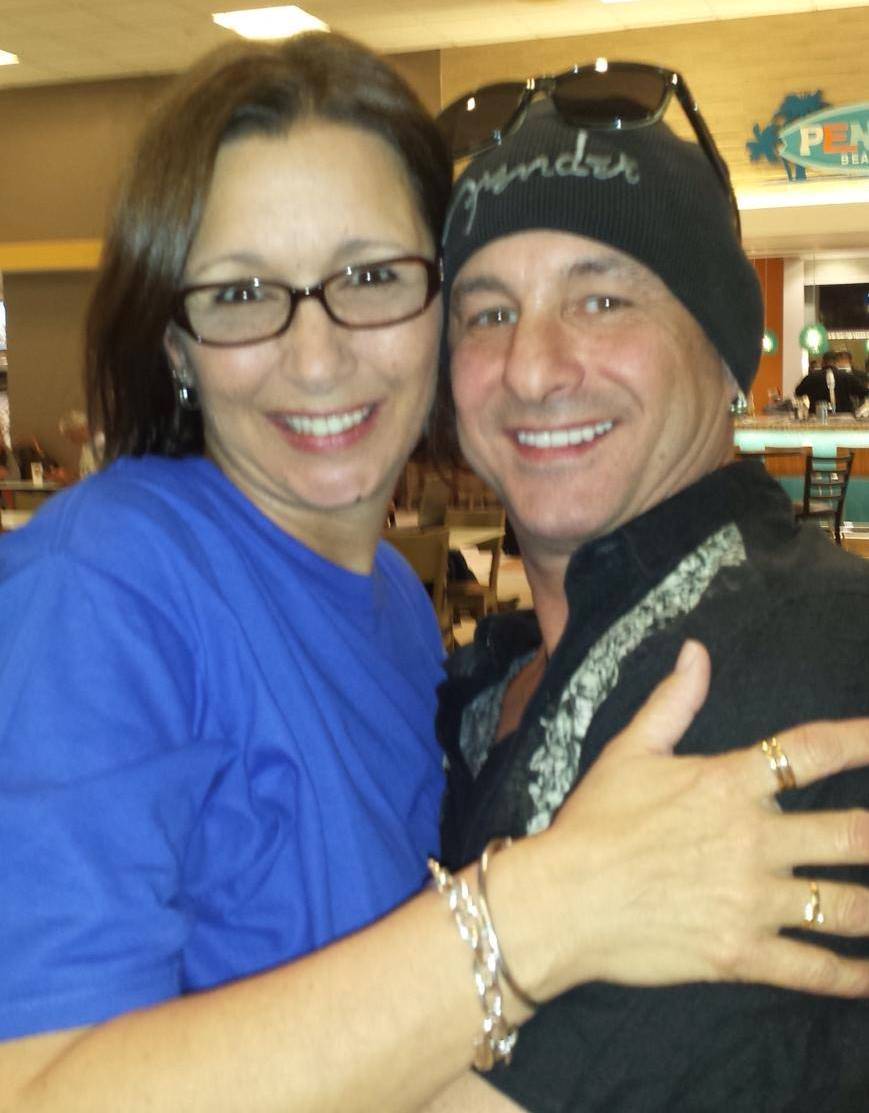Edith Lodelle Kehl Edwards (1897 – 1983) was my grandmother. She was funny, playful, outspoken, stubborn, strong, and hard-working. She was very devoted to her family and to her Christian faith. She was an expert seamstress and tailor and wonderful with crochet and embroidery as well. She was also a great cook of simple country food.
Edith was born in 1897 to Andy and Ellen (Rogers) Kehl. She was petite with nearly black, naturally wavy hair and dark eyes like her father’s side of the family. She was a beloved only child and grew up on the farm near Nortonville in Morgan County, Illinois along a country road called Possum Trot. She told me how fun it was to play with the lambs on her farm and bottle feed the orphaned ones when she was a girl. She had many cousins who lived nearby and she remained close with many of them all of her life. She loved music and played piano as a teen for Union Grove Baptist Church. She had only the opportunity for an 8th grade education—high school wasn’t offered in her rural area—but she was very bright.
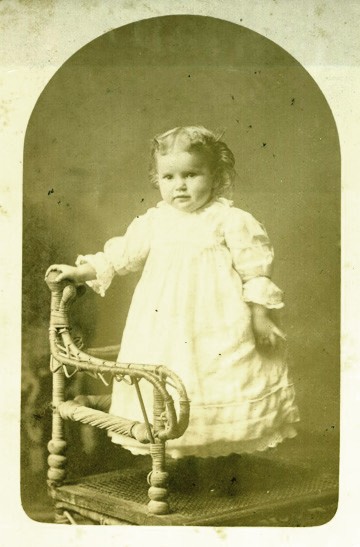 She told me of her memories of her maternal grandmother, Melissa Young Rogers, who lived in a log cabin behind their home and was a kind and loving grandmother, and the only grandparent Edith knew.
She told me of her memories of her maternal grandmother, Melissa Young Rogers, who lived in a log cabin behind their home and was a kind and loving grandmother, and the only grandparent Edith knew.
She often spoke of what loving parents she was blessed with. Because her mother suffered sunstroke as a teenager working in the fields, she was unable to do the really heavy work involved with running a small farm and household, so Edith took over the more physically challenging tasks from a very young age.
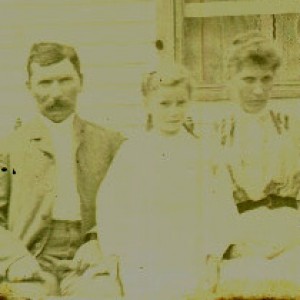
Andrew, Ellen, Edith Kehl
She decided as a teenager that she wanted to have a middle name, so she picked out one that she liked and used it from then on. She often had a mischievous twinkle in her eye and liked to play practical jokes. She had that twinkle in her eye when she told me of when she was a teenager and accepted the invitation of a suitor to go walking one afternoon. As he left her back at her home and went on his way, he narrowly missed bumping into another young man coming to call and to take her to a church meeting that evening. Her daddy told her not to let that happen again.
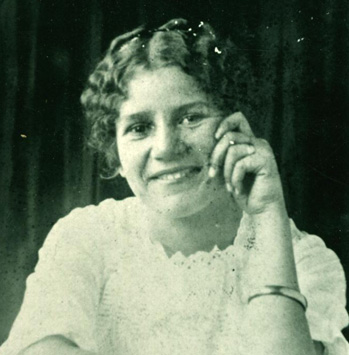
Edith as a teenager
She married handsome Bill Edwards in 1918 when she was 21. He was a farm boy from just a few miles away. They planned a big wedding at their church in Nortonville, but Edith didn’t want to include a particular cousin she didn’t get along with. Her mother told her that she could not invite all of her other family members and exclude that one, so Edith, stubborn as she was, gave up her idea of a fancy wedding, and she and Bill traveled to the county seat to be quietly wed.

Wedding
They continued to farm for some time, but Bill had never liked being a farmer, and in his 30’s he felt called as a minister and began to pastor many small, rural churches in West Central Illinois. Edith was not the typical meek and mild minister’s wife. She could have a sharp tongue, and when she was annoyed with someone, everyone knew it. She occasionally let fly a curse word or two in anger and sometimes dozed off during Sunday School class. But she tried her best and was very proud of her husband.
The churches were not able to pay enough to live on, so they always worked additional jobs. They had the Nortonville General Store for a time. They had a truck-driving business going from their area to and from East St. Louis with produce and goods, and things went well for their business. Edith drove the trucks just as Bill did.
During the 1920’s, she lovingly cared for both of her parents and her mother-in-law in her home in their old age and through their final illnesses. She provided compassionate care for her mother-in-law Avia, who was suffering from terminal cancer, even though Avia had always treated Edith unkindly. Avia was a widow who depended on her youngest son to farm her place, and she had resented Bill marrying. Edith’s care for Avia in her final months changed Avia’s heart toward her.
The Depression was very hard on them. They lost the trucking business, and all the people who had purchased on credit from their store were unable to settle their bills, so the store was lost too, then the farm and home she had inherited from her parents because it was mortgaged to the trucking business. Edith took a job as a nanny for the little boy of a wealthy family in Jacksonville, moving in with them while Bill stayed at the home-place near Nortonville and did what work he could find in addition to pastoring. Edith was always willing to do whatever work she needed to do to help support her family.
Edith and Bill loved children and remained childless for many years, giving up hope of becoming parents, but in the end they raised two children, Alberta and Esther.
Alberta Piper was a neighbor girl who was orphaned about 1929 at age 9. She told her older sister that she wanted Bill and Edith to be her parents, and although the adoption was never legally formalized, Alberta became their daughter and they had several happy years together. They adored her. Alberta was musically gifted and she often sang at their church services, sometimes with Bill, who had a lovely singing voice. She also played piano beautifully.
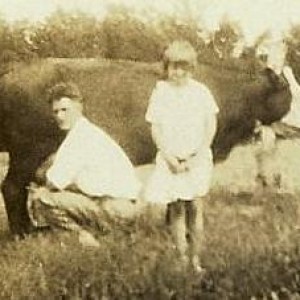
Bill and Alberta
As Alberta grew into adolescence, she probably felt constrained by the life of a minister’s daughter. Her parents were strict, and she was not allowed to go to the movies or dances her friends attended. When she was forbidden to go see a traveling circus, she ran away with the circus and never returned home to stay. She was 16. This broke Bill’s and Edith’s hearts, and they mourned this loss the rest of their lives. Alberta went on to have a career as a nightclub singer and visited them from time to time, but their relationship was never the same.
In 1936, in the midst of their intense grief over Alberta and on the heels of their devastating financial losses, Edith had a terrible fall. She slipped on an icy step and struck her head on a metal boot scraper, causing a concussion that caused seizures. It should be pointed out that in this era, epilepsy and seizures carried a heavy stigma. It was viewed as something to be ashamed of and associated with insanity. When seizures could not be controlled, the patient was often sent to a mental hospital indefinitely—there was no known treatment. Edith’s seizures became frequent and violent, and there was reasonable fear that they would cause her further injury. She was unable to be left alone, so she and Bill moved in with his brother Frank and his family for a time. Edith was a person with a strong sense of pride and was fiercely independent, so this was a horrible time for her. People began to treat her with pity or avoidance and she felt bitter and ashamed. When the church Bill was serving took up an offering to assist them, she refused to accept it.
We can only imagine what a difficult time this was for Edith and Bill, feeling hopeless for her future while mourning the loss of relationship with their beloved child. On top of all this, Edith was feeling quite sick and felt sure she had a tumor growing in her abdomen. Having nursed her mother-in-law through ovarian cancer, she knew the early symptoms were similar to what she was experiencing. She was very frightened. When she consulted the doctor, she learned she was pregnant—at age 39! What a happy surprise this was. This was what they had longed for all these years. But as reality sank in, it almost seemed a cruel trick. Her seizures were increasing in frequency and there was the new fear that she would miscarry. Once she had 16 seizures in one night, with Bill on his knees praying all night and trying to hold her so she wouldn’t be harmed. They wondered what sort of mother she could be in her condition. It would not even be safe for her to hold the baby for fear of a seizure that might cause her to drop or fall on the infant. They despaired that there might be no choice but to heavily impose on family members so she would not be alone at any time (they couldn’t possibly afford to hire a caretaker) and her interactions with her baby would be quite limited, or she would become a resident of a mental hospital and their lives as a family would be over. They continued to pray.
In her final month of pregnancy, Edith contracted pneumonia and became critically ill. She carried to full-term, but Esther Irene had to be delivered by c-section, a very risky procedure in the mid-1930’s, especially so with an older mother in weakened condition. Edith nearly died during surgery, and remained close to death all week. She told me she almost stopped fighting, but she had a strong spirit and somehow she survived. The concern was for what came next. Institutionalization while someone else raised her child was her greatest fear. Then what seemed a miracle occurred. Medication was developed that controlled seizures in many patients. She was one of the first patients to take phenobarbital, and it worked. She resumed a normal life again, free of the seizures and free to return home to her little family and a new start.
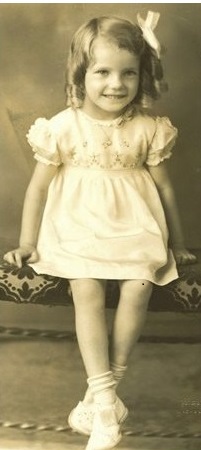
Esther Irene
Edith often worked as a seamstress while they brought Esther up and Bill worked as a door to door salesman in addition to serving as a pastor. She wanted him to look dapper and professional in the pulpit, and she took pride in making all of his suits. Esther had happy memories of living in the tiny towns of Nebo and Pleasant Hill as a young child, as her dad served as pastor in those communities. About the time Esther was 9, the family settled permanently in Alton, living first on Yeager then Rockwell Street, where they remained. They joined and became active with Calvary Baptist Church although Bill continued to serve small churches off and on. Theirs was a strict but loving home for their daughter. Esther recalled that it was sometimes tough being a preacher’s kid, and she was disappointed that she was not allowed to do some of the things her friends were allowed to do, such as go to the school dances. With a great deal of wheedling, they did allow her to go to the skating rink where she had lots of fun with her friends. She was the apple of their eye, and she knew it.
Bill began having heart problems when he was still in his 40’s, and suffered at least one major heart attack. He had little faith in traditional medicine, and insisted on allowing only a doctor of chiropractic to treat his condition. In 1953, Esther was 16, and there came a day she had been arguing with him—probably behaving as a typical teen. Her mother was in another room of the house. Suddenly, with no warning, her daddy collapsed to the floor in front of her. He had suffered a fatal heart attack at age 57. The lives of his wife and daughter changed instantly. Esther never really recovered emotionally from witnessing this event; it haunted her for the rest of her life.
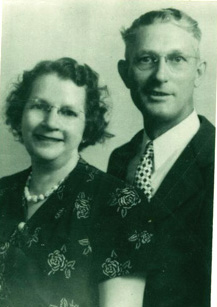
Bill & Edith Edwards
Edith, being of a practical bent, pushed down her own grief, presented a strong front for her daughter and again did what was necessary for her family. Bill left no pension, and Edith was no longer young, but she worked very hard to provide for herself and her daughter. She did all sorts of jobs. She was the alterations lady at the fancy department stores in downtown Alton. She did housecleaning, took in laundry and ironing and mending. Like most everyone at that time she used a wringer washer and washboard and hung everything out to dry on the line. There was no permanent press fabric and everything had to be ironed. There was no air conditioning in those days and in the summer the work of washing, hanging and ironing was grueling in the heat.
Shortly after Bill’s death, Edith’s beloved uncle, George Kehl, came to live with them. George was a widower with no children, and although his health was still pretty good, he was in his 80’s and ready to leave the farm at Nortonville. Edith had grown up with Uncle George next door, and they had always been very close. George and her father had worked the farm they inherited from their parents together. I believe he thought of Edith as his daughter. Her parents had been gone for many years, and he was a comfort to both of them to have around the house. He was a goodhearted person with a quick wit and a mischievous twinkle in his eye. He became like a grandfather to Esther and they enjoyed a great relationship.
Esther recalled how welcome her mother made her friends feel in her home and how much her friends liked her mom. She was so much fun to be around.
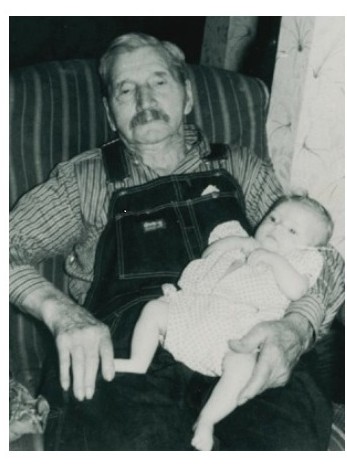
Uncle George and Juli, ages 93 years and 3 months
Esther attended college and received her teaching degree. This was made possible by her mother’s hard work and sacrifices. While in college she met Neil Claussen. Although Neil grew up in Bethalto, his father was from the same vicinity where Edith grew up, and the name “Claussen” had a bit of a reputation back home, due to a couple of less reputable members of Neil’s extended family. Edith was concerned and warned Esther against dating a Claussen, but upon getting to know him and seeing the way he treated Esther, Edith became his biggest fan. Esther and Neil married in 1958, and I was born the next year, much to the delight of Edith and Uncle George. There is a photo of me as a tiny baby in Uncle George’s arms while he beams. He died shortly after this at age 93.
I was Edith’s only grandchild until I was 7, and she delighted in spoiling me. When my brother Billy joined our family through adoption when he was 6, she was worried that eventually he might give our parents heartache like her adopted daughter Alberta had given them so many years ago, but she quickly put that aside and embraced him into the family.
As a grandmother she excelled. She always found time to make homemade cookies, with both of us eating liberal scoops of raw cookie dough while we giggled. She made all our favorite foods for us. She taught me to sew on the machine and by hand from the time I was very little. She was pleased that I showed an avid interest in the many beautiful quilts her mother had made and in hearing her stories about her family and her life as she was growing up. She enjoyed making special things for my mother and brother and me – clothes for my dolls, matching bedspreads and curtains for our rooms, fancy dresses, including matching mother & daughter dresses, and my first formal. I remember going with her to her church and rummaging through her purse for the Chiclets and little connect-the-dots and coloring books she had inside to keep me occupied. We would pound out tunes on the piano in turns and sing. (She always told me that someday I would have her piano, and I still do.) She always enjoyed having a dog, but never a cat. She enjoyed planting flowers and especially loved sweet peas and red climbing roses, which adorned her yard. She canned produce and her peaches, jar opened in the dead of winter, were amazing. She made divinity every Christmas, in several flavors to bring to all her friends and relatives. She made beautiful embroidered pillow cases and gave them as gifts for many years. We traveled back home with her often to attend the Nortonville homecoming, see her cousins and friends and attend services at Youngblood Baptist Church and visit Whitlock Cemetery where her family members lay. She hosted countless wonderful holiday meals and family gatherings, often with fried chicken, mashed potatoes and gravy, slaw and fresh baked pie—everything made from scratch, of course.
In her later years, to supplement her meager income she took in boarders, one young man at a time. They rented her spare room and she provided them with meals, laundry, and mothering. Her last boarder was Vincent “Harry” Watkins, a fellow who was estranged from his former wife and children. He had no other family and came from New York for a job in Alton. He remained for many years. They would sometimes fuss like cats and dogs, but they relied on each other. He did home and yard maintenance to help her out, and we provided him with a family of sorts.
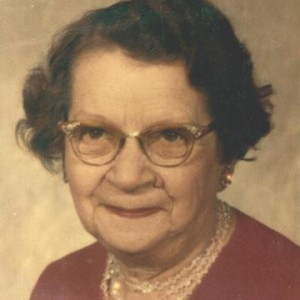 When Edith was in her 70’s, she fell in love again. She and a childhood friend and schoolmate, Claude Morris, a widower, reunited and became inseparable for several years. He still lived “up home” and they were always going back and forth to spend time with each other. They were so cute when they were together. They held hands, snuggled on the couch, and acted like a couple of kids. They wanted to marry, but sadly, one of his grown children protested—she didn’t want her dad to remarry and didn’t care for Edith—and in order to keep the peace, they did not. Before long, Claude’s health rapidly diminished, and he passed away. I remember how sad she seemed at this time.
When Edith was in her 70’s, she fell in love again. She and a childhood friend and schoolmate, Claude Morris, a widower, reunited and became inseparable for several years. He still lived “up home” and they were always going back and forth to spend time with each other. They were so cute when they were together. They held hands, snuggled on the couch, and acted like a couple of kids. They wanted to marry, but sadly, one of his grown children protested—she didn’t want her dad to remarry and didn’t care for Edith—and in order to keep the peace, they did not. Before long, Claude’s health rapidly diminished, and he passed away. I remember how sad she seemed at this time.
In Edith’s final years, her eyesight diminished to the point she could no longer do much sewing or the embroidery work that she enjoyed. This was very frustrating for her, because she felt she could not contribute. She wanted to be useful, always. There had never been a time she hadn’t worked hard and been of help to others. Having others care for her was not to her liking at all. Harry made it possible for her to stay in her own home for quite a while. He was by then retired and looked after her. Gradually their roles reversed—he cooked and did the laundry and housework. She and I remained close, although I was by this time away at college. We phoned, and I visited often. There came a time when she needed more care than Harry could provide, so my parents moved her into their house. By this time, Edith’s mind was cloudy sometimes, but she still always recognized us and tried to maintain her good humor. She passed away at age 86 in 1983, and was laid to rest next to Bill in Upper Alton Cemetery.
Two years later, I was looking for a wedding dress. I was at my parents, and talking with Mom about my preference for vintage dresses. Mom pulled out a long white cotton eyelet dress, explaining that she found it in Grandma’s things. Neither of us recalled her ever showing it to us. We recognized it was the same dress Edith wore in her 8th grade graduation photo about 1911, a beautiful portrait I had always admired. We knew she had made it herself. I tried it on and we were amazed. It fit me like it was made for me. I instantly knew that this was my wedding dress. Mom said Grandma would have felt it wasn’t good enough for me to be married in, but would have wanted me to have something fancier like a ball gown in satin and lace. She was right, but for me, the dress was perfect and wearing it on my special day helped me to feel her presence with me. Now she and I both have lovely photos wearing her dress.
The 12-piece china set she stretched her budget to purchase for my hope chest when I was a young child graces my holiday table. Her mother’s precious quilts have a place of honor in my home, as does Uncle George’s trunk with his keepsakes still inside. I use her 1960 Singer sewing machine, and I make her delicious pumpkin pie. Now that my mother is gone, I wear Edith’s wedding ring. And I always think of her and laugh while I eat a spoonful of cookie dough before the cookies go into the oven.
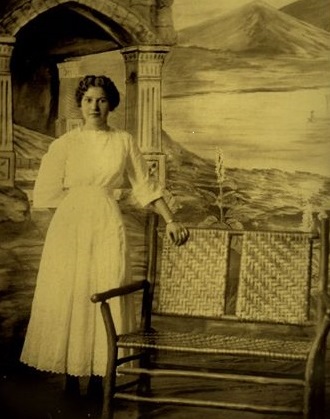
Edith in her dress c. 1912

Juli in her wedding dress, 1985
